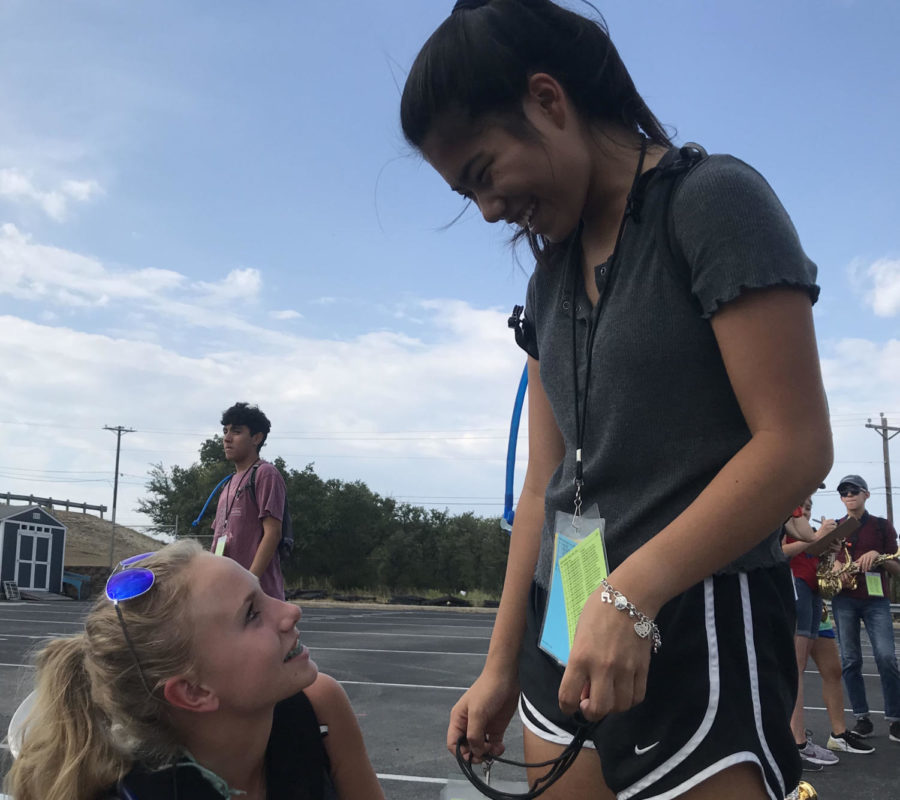Sophomore strives to lead section
Underclassman tenor saxophone section leader comes into her own
Before band rehearsal begins, sophomore Emily Armstrong passes out marching coordinate sheets to her fellow freshman saxophonist, Sayde Jackson. Armstrong led her peers at practice by helping adjust marching form and guiding new band members.
October 18, 2019
The new director’s student leadership team sheet, taped by the band door, announced the next year’s leaders. Sophomore Emily Armstrong made her way through the crowd. Her eye caught on the name she sought: her own.
Armstrong earned the role as tenor saxophone section leader, an unusual accomplishment for an underclassmen.
The title seemed so exhilarating, but Armstrong knew she had to kick it up a notch.
“It’s a lot of pressure to do well because you don’t know exactly what you’re doing, and it’s a whole learning experience to have other peoples’ opinions involved.” Armstrong said.
With only one year of marching experience, Armstrong needed grit to become settled into the role of a section leader. Not only is being a section leader a difficult task for anyone to achieve, but as an underclassman, Armstrong dove head-first into something she was not familiar with after only one year of band experience under her belt; however, she discovered that her ability to help others and allow them to succeed really helped her be more comfortable with her title.
“I would say it’s difficult but it’s also fun to have that title and be able to help others,” Armstrong said.
For Armstrong, the responsibility of being a section leader piled more onto her already full plate of schoolwork and extracurricular activities.
“I’ve done pretty well with school. It just was a lot at first because you’re trying to be this perfect person for the band, but at school you’re just trying to do what you want for yourself.” Armstrong said.
Correcting and guiding your peers can be a daunting experience, especially when they’re your close friends.
“I had a hard time in the beginning especially balancing the difference between being a leader and a friend,” Armstrong said.
Along with learning how to manage her time, Armstrong also learned to develop thicker skin when it came to conflicting opinions and judgment from her peers.
“I think for me it’s just taught me not to care about other people’s opinions as much because you can do so much for others and not get anything back, and that’s OK.” Armstrong said. “It helps a lot because then you know your character, and it makes you more secure of yourself because you know you’re doing the right thing even if people don’t see it as the right thing.”
Armstrong received hateful messages through social media and iMessage from some of her sectionmates who also tried out for the role and were upset that they had not received the title.
“I did not think I was gonna have to deal with people sending me hate texts and comments,” She said. “I knew it was gonna happen, but I didn’t think it was gonna be to that extent.”
To any future section leaders, Armstrong advises they trust their instincts, and don’t doubt themselves when others offer unconstructive criticism.
“Take everything everyone says with a grain of salt because [your leadership style] is not gonna work for everyone,” Armstrong said. “Their experience is so different from others.”
For Armstrong, the workload and the criticism is worth powering through because of the friendships she formed and the peers she led to improvement.
“I think the reward is knowing that I’m helping others, and they’re getting things out of it, and I’m still making friendships with the underclassmen.” Armstrong said. “I don’t think I would have put myself out there so much if I wasn’t a section leader.”


